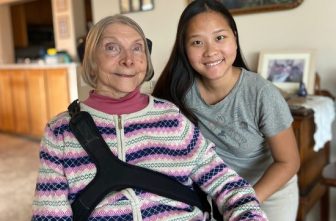
Addressing reporters the same day Chicago-born Cardinal Robert Prevost was announced as Pope Leo XIV, Archbishop Bernard Hebda rejoiced in an American pope.
“I never thought I would see an American pope,” the archbishop said May 8 on the front lawn of the Archdiocesan Catholic Center in St. Paul. “How exciting is that?”
Part of his excitement stems from the experience Pope Leo had growing up in the Church in the United States and can share as pope, such as understanding the multicultural roots of the U.S. Church and the needs of Catholic education, Archbishop Hebda said.
Asked why he never expected an American as pope, the archbishop said two things: The U.S. Church’s experience can be perceived as distant from the Church in Rome and the politics can be challenging.
“How is it that the Holy Father is able to deal with President Trump, for example, or whoever” the United States’ president might be? Archbishop Hebda asked. “Would those ties be too close or too distant? And so, I just never imagined that we would have an American pope. I have great confidence that Pope Leo will do a wonderful job of navigating that.”
While born and raised in Chicago, Pope Leo XIV joined the Augustinian order, and in 1985 he joined its mission in Peru. He largely worked in Peru until 1999 when he was elected head of the Augustinians’ Chicago-based province. He served as prior general of the worldwide order from 2001 to 2013. The new pope speaks English, Spanish, Italian, French, Portuguese and he can read Latin and German.
The archbishop said he has never met Pope Leo, though he has exchanged letters having to do with administration of the Church.
The name a pope chooses is significant, and the last Pope Leo was “the pope who really did the most, I think, to promote the social teaching of the Church, the social doctrine of the Church, which was certainly something near and dear to Pope Francis’ heart,” Archbishop Hebda said. “So, the fact that he chose Leo would suggest that’s going to be really important for him.”
The pope is not just for Catholics, the archbishop said, “but for all people. One of the things that amazed me was with the passing of Pope Francis to see how many non-Catholics, non-believers, reached out and said that they’re missing the moral voice that Pope Francis had. So, the pope has a global pulpit to be able to speak about issues and to do it in a way that really calls for trust from people as well. We certainly need that moral voice in our world. And I’m hoping that Pope Leo will be able to be that voice that we need. I trust that he will.”




